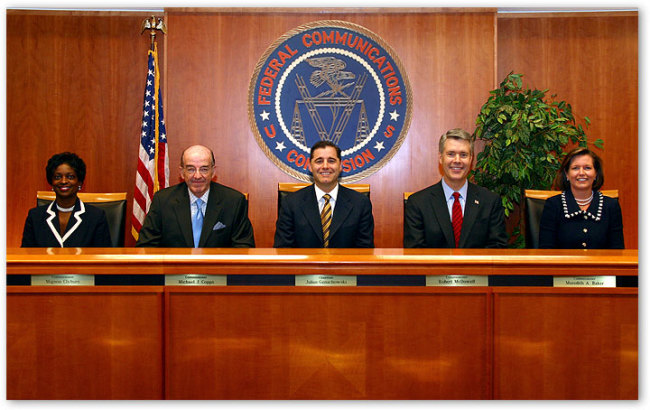
FCC Adopts Net Neutrality
Today the FCC voted for the adoption of “Net Neutrality” regulations and it passed 3-2. So what does this mean? It’s a bit confusing, it is a mostly watered down version of what once was a truly convincing argument for transparent and “free” internet for all. Instead we have a somewhat transparent and kind of “free” internet. The rules ignored wireless internet almost entirely, leaving that still completely unregulated and leaving us at the will of the Verizon’s and AT&T’s of the country.
So what does it all mean? I’m going to try to break this down, because it is an important discussion that is unfortunately being swept underneath the political rug, many, many, many sites are joining in on this due to its importance.
These regulations argue for:
- No discrimination by broadband providers for lawful websites. What does this mean? Well, as of right now there is no regulation for internet providers to provide equal and open access to websites. If all of a sudden Comcast decided Netflix was too heavy of a load, they could start to limit access or cut it off. Under this new rule, all providers would be required to allow open access to websites which is where the distinction is made, because it does allow limitation or prevention from wireless providers on applications and items that compete with their own. As Al Franken, Senator from Minnesota, put it; “Maybe you like Google Maps. Well, tough. If the F.C.C. passes this weak rule, Verizon will be able to cut off access to the Google Maps app on your phone and force you to use their own mapping program, Verizon Navigator, even if it is not as good. And even if they charge money, when Google Maps is free.” And he’s right for the most part. There is no prevention of control over applications, especially under wireless internet.
- Require transparency from broadband providers about how they are permitting access. What does it mean? This one seems pretty cut and dry. Broadband providers still have the ability to throttle, or downgrade, your stream when it sees fit or necessary and now they have to publish when and why this is happening. They don’t like bit torrent? well they can throttle that connection down, but now they have to tell you they are doing it. Before, they would and had been proven to throttle certain connections when their network required it. The only way we would know it was happening was through internet watchdog types who would then write about it.
- Broadband providers may engage in reasonable network management. What does this mean? They can tier their pricing and provide fast lanes for companies purchasing it at higher prices. Also this could mean preferential treatment for sites of their choosing and limiting bandwidth to sites that don’t pay for access. Sounds totalitarian and it essentially is. Youtube wants good service, they have fistfuls of cash and can pay for it. Vimeo tries to compete, well without the funding they may not be able to. This is a worst case scenario, but is completely not addressed.
So I have a hard time agreeing with the statement that this provides for an open and accessible internet. This is a limp proposal that tries to make everyone happy, rather then taking a stance on what needs to happen. To put a personal twist on this. We run this website from our living room. We do it on minimal (almost nil) funding and love sharing our thoughts and opinions about nerdery. Without a strong stance on net neutrality and equal access rights, sites like ours may have to pay for access from ISP’s. If we don’t want to, or our traffic doesn’t demand notice, then we don’t get to be a website. Simple as that. It means that the already established media would stay as it is. Greasing palms and making fistfuls of cash would take place of sharing ideas and expressing opinions. Sites like Facebook would survive due to their sheer size and strength, but the next Facebook may never be able to come to exist. So basically this proposal is a step in the right direction as the White House has put it, but it is nowhere near the kind of regulations that need to exist. Most of these rulings may not stand up in court if challenged and most likely all of them will be since this has made neither side happy. My biggest feeling in all of this, is that regulation needs to exist due to the fact that there is essentially no competition in broadband access. If you live in the wrong area, you get the internet that that provider chooses to give you. If Verizon had to compete with Brighthouse who had to compete with Comcast all in one area, I could choose who gives me the internet I would like best. This is another argument altogether. I think these regulations do nothing more then obfuscate this issue and placate the masses by taking no stance at all.
Any of you have any thoughts on this? Did you know it was going on? Please join in below.
This Post Has 8 Comments
Comments are closed.





I wasn’t really aware of the situation other than by the headlines. But hey, everything else eventually gets crapped up (I’m looking at you Cable and Radio) so why leave the Internet out of the party. Maybe throttling Netflix will lead to a renaissance in HAM radio, books, and board games. Where the providers may think they can squeeze for more cash, you’ll find no such satisfaction from me. Same for wireless; if they keep overcharging for bits with arbitrary tiered pricing, and I’ll just go back to using a dumb phone.
Scott, I’m assuming you are referring to this: http://www.engadget.com/2010/12/19/wireless-carriers-openly-considering-charging-per-service/
I appreciated your article, Matt. I have heard this issue referred to fleetingly quite a bit lately, but have been too lazy to look it up. Thanks for helping me out.
That’s the one. I think some folks will find they can be just as happy with less (internet) if it comes to that.
Interesting stuff! Hopefully we never go back to a “pay by the bit” or “pay by the hour” formula. I used to get reamed when I went over my limit on my Prodigy account… yes, prodigy.
I thought I’d clarify real quick. I don’t mean that the internet NEEDS regulation, but when you half ass regulation and leave gaping loopholes in it, you basically sanction the actions that are left available. I would have rather had no regulation at all vs shitty limp regulation that doesn’t really do much.
heh. limp.
I’ll never get used to reading ” Al Franken, Senator from Minnesota”
Just tell me what is important… how is this going to effect streaming pornography? A friend wants to know…